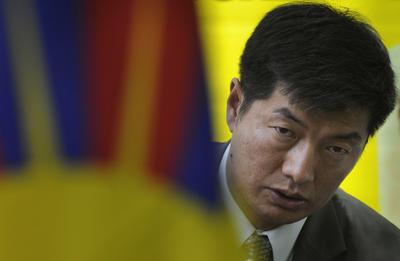Receiving 55 per cent of the ballots, Dr Lobsang Sangay, a Harvard law scholar, was elected on 27 April. Whilst democratic elections have been organised by the exile government since 1960, this year’s elections are important for one key reason: on 14 March 2011, the Dalai Lama announced to the Tibetan Parliament-in-Exile that he was retiring from political life and would devolve his political authority to elected leaders.
Despite this decision raising important constitutional issues for the exile government, the transferral of political authority to an elected leadership is seen by the Dalai Lama as in the best interests of the Tibetan people. It circumvents China’s claim to appoint the next Dalai Lama by positioning Tibetan temporal authority outside of China, and encourages the elected exile leadership to assume greater responsibility. The Dalai Lama’s decision to stand down from political life means that the new Kalon Tripa is expected to take on much of the political authority previously borne by His Holiness. With more political clout, Lobsang Sangay will play a significantly more prominent role in the Tibetan movement than his predecessors.
Born in 1968 to parents who escaped from Tibet in 1959, Lobsang Sangay grew up in a Tibetan refugee settlement near Darjeeling. In 1992 he was elected as an executive member of the Tibetan Youth Congress (TYC), the largest Tibetan NGO in exile. With a Tibetan Fulbright Fellowship, he moved to Harvard Law School in 1995 where he received his LLM and later, a doctorate. During his time there, he held the position of Research Fellow at the East Asian Legal Studies Program, and organised a series of conferences bringing together Chinese, Tibetan and Western legal scholars.
Young, Western-educated and secular, Sangay represents a significant shift in exile leadership, and the recent elections have heralded a new era of Tibetan politics. To date, Tibetan democracy has been dominated by cultural values which promote humility and regard self-promotion negatively, resulting in candidates who are often reluctant to put themselves forward and a general lack of voter engagement. In contrast, with the Dalai Lama’s impending retirement alongside dynamic candidates and an increasingly web-savvy diaspora, the 2011 elections saw lively political debates in cities across the world. With unprecedented public engagement in these elections, especially among younger Tibetans, exile democracy is finally coming of age.
What about the future of Tibet itself? In initial statements post-election, Sangay declared his intention to retain the Dalai Lama’s ‘Middle Way’ stance on the future of Tibet and relations with China. He will seek genuine autonomy for the Tibetan people within China through peaceful negotiations. Questions have arisen regarding how Sangay, who has never set foot in Tibet, will foster such a dialogue with Beijing. He has stated that he is ‘willing to negotiate with the Chinese government anytime, anywhere’, but faces significant challenges. With nine rounds of talks between the Dalai Lama’s envoys and the Chinese Communist Party’s United Front Work Department having yielded no progress, the Middle Way approach is arguably at an impasse. Moreover, alongside on-going statements that the exile Tibetan government is an illegal separatist clique, the Chinese Government’s reaction to Sangay has been swift and damning. The Chinese People’s Daily denounced him as a ‘terrorist’ due to his previous position with the pro-independence TYC. Beijing likens TYC to ‘Al-Qaida, Chechnyan armed terrorists and ‘East Turkistan’ separatists’, and blames it for the uprising in Lhasa in spring 2008: allegations which the organisation categorically denies.
As such, Beijing is refusing to deal with Sangay or his government directly, and the extent to which the Dalai Lama will remain involved in the ‘dialogue process’ remains undecided. Perhaps other strategies will emerge. With the Dalai Lama standing down from Tibetan politics, space may open for debate within the diaspora over alternative policies for the future of the homeland, and Sangay is keen to stress his track record of closed-door discussions with Chinese scholars.
Great uncertainties lie ahead and Sangay faces daunting challenges. As the elected leader of a government which no state recognises he has the unenviable tasks of keeping the exile community together and the issue of Tibet alive in a post-Dalai Lama future; running an exile bureaucracy despite no experience of government; and dealing with a Chinese administration which shows little willingness to compromise. But he also comes to office with energy and enthusiasm for seeking justice for Tibet, the support of an exile civil service with 50 years of experience, and optimism from Tibetans inside and outside Tibet. International media are likely to keep a close eye on his progress.
Fiona McConnell is a political geographer and Junior Research Fellow at Trinity College, University of Cambridge. Her research focuses on the everyday construction of statehood and sovereignty in cases of tenuous territoriality.


This article is quite basic for a person from Cambridge. I would expect more evaluation and opinion.